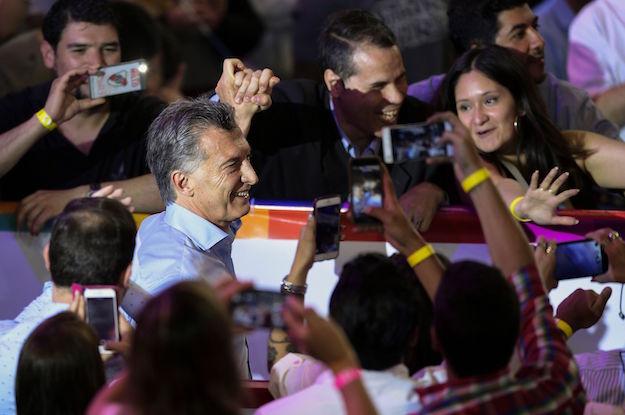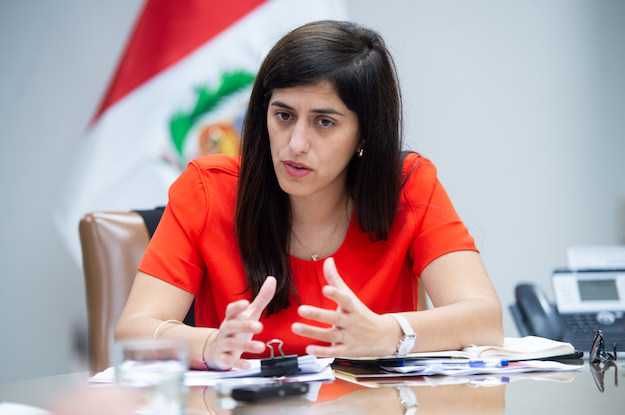This article is adapted from AQ’s latest issue on Latin America’s anti-corruption movement | Leer en español | Click here to read more about Argentina’s presidential race
BUENOS AIRES — An election year in one of Latin America’s most polarized countries.
An economy on its knees.
An unpopular president.
It doesn’t sound like a great environment for reform.
Nevertheless, a broad coalition of civil society groups, business leaders and politicians from opposing parties has managed to push an ambitious campaign finance law through Argentina’s Congress.
The story of how it happened defies several supposed rules about how anti-corruption reforms happen. For starters, there was no single leader who championed the push.
“It’s not like you have a Don Quixote going against the windmills,” said Alan Clutterbuck, the president of Fundación RAP, an Argentine civil society group.
The reform, which modifies the existing Political Parties Financing Law, seeks to reduce dirty money in politics by outlawing cash donations for campaigns. This would be a truly major shift — during the last presidential campaign in 2015, 99% of campaign contributions were made in cash, according to CIPPEC, a think tank that promotes government transparency.
The new law requires all campaign contributions to take place through the financial system and dedicates more resources to judicial regulation of campaign financing. The law also formally permits contributions from private companies in an attempt to regulate an under-the-table practice that continued even after it was banned in 2009.
CIPPEC began pushing for an improved campaign financing framework in 2011. In ensuing years, it partnered with groups like RAP and Poder Ciudadano, Argentina’s chapter of Transparency International. “It was a largely informal and quiet effort, but one that created a conversation,” said Julia Pomares, CIPPEC’s executive director.
The effort stagnated in the climate of what Argentines call “la grieta,” a bitter divide between supporters of President Mauricio Macri and his predecessor Cristina Fernández de Kirchner, which has dominated politics here for a decade.
Even after the Odebrecht bribery case implicated governments across the region and across the political spectrum, corruption largely remained a partisan talking point.
But things started to change after a former public works official was caught throwing bags of cash over the wall of a monastery in the middle of the night in 2016. More scandals followed. Last year, a journalist uncovered what appeared to be a list of fake donations benefitting mid-term candidates from Macri’s coalition. A month later, journalists published an alleged account of a decade-long kickback scheme detailed in a series of notebooks by a former government official’s driver. The operation allegedly extended all the way to Kirchner (she denies wrongdoing) and has been called Argentina’s biggest corruption case ever.
A consensus began to emerge that reforms were needed. Until the scandals, “there wasn’t political will to talk about a campaign financing bill,” said Hugo Wortman Jofre, the chairman of the board of directors at Poder Ciudadano. But while Argentines remained polarized – the Notebooks case barely changed voters’ loyalties, polls found — the civil society groups managed to convince opposing political parties to begin a dialogue on campaign finance reform.
“They helped us build relationships with members of the opposition, by sitting us down at the same table,” said Adrián Pérez, Argentina’s secretary of political and institutional affairs and a liaison between Macri’s government and Congress. Pérez worked closely with Dalmacio Mera, a senator from the opposition Peronist party, to build support for the reform in Congress. Mera, who heads the Senate’s commission on constitutional affairs, told AQ that despite his disagreements with much of Macri’s agenda, he approached this issue pragmatically.
“The quality of our democracy is directly linked with the issue of political financing,” Mera told AQ over a cup of tea in his office in Congress. “Since the beginning of Macri’s term, we’ve felt an extreme responsibility to ensure governability.”
Some have serious doubts about the effectiveness of the reform. Some opposition has come from Kirchner’s party, which criticized the bill for letting businesses, but not unions, fund campaigns. Elisa Carrió, an influential senator from Macri’s coalition, also objected to the provision to allow businesses to fund campaigns. It’s a problematic provision that detracts from other necessary reforms, said the Civil Association for Equality and Justice (ACIJ), a nonprofit group that does anti-corruption work.
“The law could create conditions where companies begin to shape public policy, where parties can only win elections with the support of businesses,” said Marcelo Giullitti Oliva, a lawyer focused on institution building at ACIJ.
Other countries have approached campaign finance regulation differently. In the fallout of the Odebrecht bribery investigation, Chile and Brazil both banned corporate donations to campaigns.
Supporters of the Argentine law, which puts a cap on corporate contributions and maintains a ban on public companies and concessionaries from funding campaigns, say it adds a level of control to what already happens.
“The presence of businesses carries a lot of risk,” said Pablo Secchi, the executive director of Poder Ciudadano. “But businesses are effectively who is financing politics in Argentina. So we’ve been looking at how can we can create the conditions so that businesses that want to can do so in a transparent way.”
Business, for the most part, has supported the reform.
“I think it will be effective,” said Julio Crivelli, a lawyer who took the helm of Argentina’s Chamber of Construction after multiple former presidents were implicated in the Notebooks case. “The existence of a legal framework is much better for companies than having no regulations.”
In fact, private-sector support was key to the reform’s passage. In February, over 20 business chambers and associations signed an op-ed published by CIPPEC, RAP and Poder Ciudadano in media outlets across the country, calling on politicians to promise not to take cash contributions in this year’s campaigns. Congress took up the bill the next month, following three failed attempts. It passed the Senate the next month.
Important questions remain over how the reform will be implemented in this year’s presidential elections. Facing a tough reelection bid amid high inflation and unemployment, Macri is hoping his administration’s efforts to promote transparency will woo voters otherwise disillusioned with his economic track record.
Fernando Sánchez, the secretary for institution-building within Macri’s cabinet of ministers and a leading voice in his administration on anti-corruption issues, has been a key backer of the new campaign finance bill. “A political campaign can be the beginning of a country’s solutions or the beginning of its problems,” he told AQ in his office in the Casa Rosada.
“But a law, while necessary, is not enough. We’ve got to change the culture.”
—
O’Boyle is a senior editor of AQ








